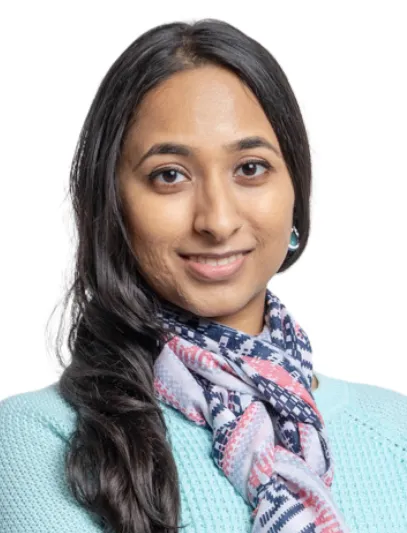- April 11, 2024
- By Karen Shih ’09
Every 33 seconds, heart disease kills someone in the United States. It’s the leading cause of death for people across gender and racial lines—but maybe it doesn’t have to be.
That’s because more than 80% of heart attacks and strokes could be prevented, according to the American Heart Association. Now, a recent University of Maryland graduate is developing a new device and app that could help millions of Americans improve their own odds of maintaining cardiovascular health, right at home.

Korion Health (“cor” means “heart” in Latin), co-founded by Akshaya Anand ’19, M.P.S. ’23 and Anna Li, a University of Pittsburgh and Carnegie Mellon University M.D./Ph.D. student, aims to create an electronic stethoscope and guided user interface to reliably record heart and lung sounds without help from a clinician.
“Telemedicine has a lot of potential to bridge barriers and make it convenient for people to access health care,” said Anand. “But it’s limited by lack of tools. Your doctor can’t reach through the computer screen. We thought: Is there a way we can use technology to make the playing field more equal.”
Using Korion Health’s device, patients, especially those in rural areas and in marginalized and lower-income communities, will be able to collect vital data at home, then send the audio files to their physician before a telehealth visit.
Anand and Li met a year into the pandemic at a hackathon, the Pitt Challenge, after Li noticed patients coming into the emergency room sicker than usual because they couldn’t access regular care to monitor chronic health conditions—challenges that continue today, as wait times to see providers lengthen.
“So many people that I care about have fallen through the cracks of the health care system,” said Li. “We want to create a way for people to get any health screening they need from the comfort and convenience of their own homes, in an affordable and accessible way.”
Advised by cardiologist Dr. Eric Dueweke of Pitt, the co-founders interviewed physicians, especially telemedicine providers, to understand their needs. A common theme was the benefit of data collected over time, especially if patients see multiple health care specialists.
“If a patient has a murmur, our device could help see if that murmur is changing—that could indicate something else is going on,” said Anand. “It’s hard to remember how someone’s heart sounded a year ago, so being able to digitize that sound is a benefit.”
Since 2021, they’ve created an initial prototype and tested it in a 20-person pilot study. That feedback informed their second iteration of the device, which they plan to test this summer. They’re focused on making it as easy to use and error-proof as possible, so that the sounds collected are accurate and useful for providers. The eventual goal is to use machine learning algorithms to help diagnose conditions based on patient data.
Throughout the development process, she has relied on UMD resources like Startup Shell and the Dingman Center for Entrepreneurship, where she’s found mentors, networking opportunities, and referrals for technology credits and discounts. The business side has presented some of the toughest challenges, said Anand, who studied biological sciences and computer science.
“I always knew fundraising was hard, but it’s very draining. I’ve had to step outside my comfort zone,” she said, joining pitch competitions, participating in startup accelerators and presenting to investors.
The next big hurdle will be U.S. Federal Food and Drug Administration approval, since they’re creating a medical device. Once they get their stethoscope to market, they hope to expand into devices to monitor the health of organs, including eyes, ears and the gastrointestinal tract.
Working on Korion Health “fills me with purpose,” said Anand. “Every day I wake up motivated and excited, working on something to help others in the community. That makes all the difference.”
